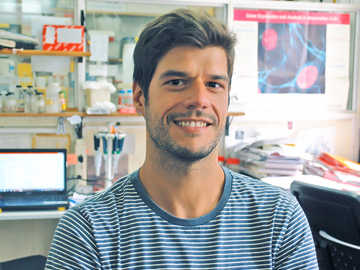CONICET Adjunct Researcher / Assistant Professor UNC
Director: Dr. Beatriz Caputto
Phone: +54 351 4334168/71 int 3439
E-mail: cprucca@fcq.unc.edu.ar
Research Topic
c-Fos: an attractive new therapeutic target for brain tumors. Regulation of phospholipid synthesis mediated by c-Fos. c-Fos and tumor growth.
Central nervous system (CNS) tumor growth depends on the activation of phospholipid synthesis mediated by c-Fos. Studies from our laboratory in tumor cells NB41A3 (human neuroblastoma), in C6 cells (rat glioma), in T98G and U87MG cells (human glioblastoma multiforme) show that: a) c-Fos levels below its detection limit in quiescent cells and abundant expression in proliferating cells; b) co-location between c-Fos and ER markers; c) higher levels of phospholipids synthesis in proliferating cells compared to quiescent cells; d) an correlation between expression levels of c-Fos, the cell proliferation rate and level of phospholipid syhtnesis. Furthermore, blocking of c-Fos using anti sense oligonucleotide disrupts tumor growth.
c-Fos and deletion mutants containing the BD domain (aa 139-159) activate phospholipid synthesis in vitro while those who do not have the BD do not. The deletion mutant NA (aa 1-138) or LZC (163 amino acid C-terminal portion), both mutant lacking the BD domain not activate the synthesis, while the NB (aa 1-159) mutant that include the BD domain activate the synthesis with an efficiency similar to that of full lenght c-Fos.
These results indicate that c-Fos plays an important role in phospholipid metabolism, the quantitatively most important constituent of biological membranes. Since the synthesis of these lipids is required for the differentiation, proliferation and cell growth, and that in normal brain tissues c-Fos not expressed, c-Fos is an interesting cellular target for the development of therapeutic strategies with the aim to block and/or decreased tumor growth.
Selected Publications
- Cellular inactivation and antitumor efficacy of a new zinc phthalocyanine with potential use in photodynamic therapy. Vittar NB *, Prucca CG*, Strassert C, Awruch J, Rivarola VA. The International Journal of Biochemistry and Cell Biology. (10): 2192-2205.(2008). * Both authors contributed equally.
- Antigenic variation in Giardia lamblia is regulated by RNA interference. César G. Prucca *, Ileana Slavin*, Rodrigo Quiroga, Eliana V. Elijah, Fernando D. Rivero, Alicia Saura, Pedro G. Carranza & Hugo D. Lujan. Nature. 456 (11): 750-754 (2008). * Both authors contributed equally.
- ORF-C4 from the early branching eukaryote Giardia lamblia displays characteristics of alpha-crystallin small heat shock proteins. Nores MJ *, Prucca CG*, Quiroga R, Elijah EV, Cavallin L, Price AM, A Saura, Carranza PG, Gottig N, Solari AJ, Lujan HD. Biosciences Report. (29): 25-34 (2009). * Both authors contributed equally.
- Disruption of antigenic variation is crucial for effective parasite vaccine. Rivero FD, A Saura, Prucca CG, Carranza PG, Torri, Lujan HD. 2010. Nature Medicine. 16 (5):551-7
- The ubiquitin-activating enzyme (E1) of the early-branching eukaryote Giardia intestinalis shows unusual proteolytic modifications and play important roles during encystation. Child CA, Prucca CG, Chaparro J, Lujan HD, Wasserman M. (2012). Acta Trop. 2012 Jul;123(1):39-46.
(See more publications–CONICET)
Brief CV
Academic Formation
- Bachelor in Biological Sciences. National University of Rio Cuarto. (2006)
- PhD in Biological Sciences. National University of Córdoba. (2012)
Research Background
- Undergraduate research work “Studies on the mechanism of cell death induced by phthalocyanines derivatives”. Director: Dr. Viviana Rivarola. (2006). National University of Río Cuarto.
- PhD thesis “Mechanisms of gene regulation in the intestinal protozoa Giardia lamblia. Implications in antigenic variation process” Director: Dr. Hugo D. Lujan. (2007-2012). National University of Cordoba.
- Training in inmune response evaluation and development of VLPs (viral like particles). Dr. David Klatzmann Laboratory. I3: Immunology-Inmunopathology-Inmunotherapy. UMR7211 (UMPC / CNRS), U959 (INSERM). Bâtiment DEER, CHU Pitie-Salpetriere. 83 boulevard de l´Hôpital. 75651 Paris Cedex 13 (France). Director: Dra Eliane Piaggio. (2011).
- Posdoctoral position at Dra. Beatriz L. Caputto Laboratory. “Mechanism of phospholipids syntehsis regulation by c-Fos. implication in brain tumors proliferation” National University of Cordoba (2012-2015)
Teaching Background
Past positions:
- Assistant professor at the Medicine School -Catholic University of Córdoba-Argentina. 2009-2012
Actual position:
- Assistant professor at the College of Chemical Sciences-National University of Córdoba-Argentina



